|
|
|
Sort Order |
|
|
|
Items / Page
|
|
|
|
|
|
|
| Srl | Item |
| 1 |
ID:
118937
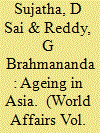

|
|
|
| 2 |
ID:
149541
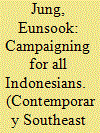

|
|
|
|
|
| Summary/Abstract |
Many scholars argue that democratization is conducive to the development of social welfare policies and that democracy brings about redistributive reform due to demands from the newly enfranchised poor. In reality, however, democratization does not necessarily bring about comprehensive social welfare reform. If not democratization, what explains social welfare expansion in developing countries? This article examines Indonesia, which began the process of democratization in 1998 following the fall of President soeharto, and which has since become a stable democracy with a consistently growing economy. More than a decade after soeharto’s resignation, Indonesia started to implement a comprehensive healthcare policy. What explains the gap between the enactment and the implementation of this social policy reform? In answering this question, I argue that electoral competition alone does not shape social policy reform. Instead, social reform has institutional prerequisites, such as the broad-based organization of its advocates. A broad-based organization goes beyond its narrow interests, builds cross-class alliance and pressures the government. Without this prerequisite, democratization does not necessarily result in comprehensive social reforms.
|
|
|
|
|
|
|
|
|
|
|
|
|
|
|
|
| 3 |
ID:
167500


|
|
|
|
|
| Summary/Abstract |
Increasing legibility is now available through NGO and U.N. data, which has been collected across Iraq, for an assessment of the contemporary state of social welfare amongst Iraqi children and the residual effects of the regime change that took place in 2003. This data will be examined, contextualized to the post-2003 period and the potential for theory-building will be explored. The picture that emerges suggests the level of humanitarian catastrophe resulting from the U.S.-led 2003 invasion and occupation recommends further interrogation of the policy of ‘regime change’ for its role in informing U.S. actions. Additionally, such catastrophic humanitarian outcomes lead to questions surrounding future use of regime change efforts. The Iraqi case exhibits the destruction of the state apparatus, with social and cultural institutions built from Iraq's 1932 independence, rather than a direct replacement of those ruling the state. Iraqi children, not yet born when the 2003 invasion took place, have borne the brunt of the Iraqi state's destruction, with an absence of care from those who carried out the change in regime.
|
|
|
|
|
|
|
|
|
|
|
|
|
|
|
|
| 4 |
ID:
111852
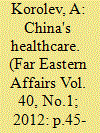

|
|
|
|
|
| Publication |
2012.
|
| Summary/Abstract |
Transition used to be seen as a unidirectional process: from plan to market, from public to private, from collective to individual. This research, on the contrary, focuses on the process of re-transition from over-marketization to a new form of state regulation in China's healthcare sector. Such process started in 2002 and included attempts to make provision of healthcare service a publicly funded industry.
The new reform in China's healthcare sector is presented as a process of development of four medical insurance nets, namely UEBMI, NCMS, URBMI and BMI for migrant workers, and their subsequent integration into a universal coverage plan adopted in March 2009. It is demonstrated that after more than 20 years of marketization, Chinese leaders attempt to reengage with healthcare sector and make it effective instrument of state building.
|
|
|
|
|
|
|
|
|
|
|
|
|
|
|
|
| 5 |
ID:
177788
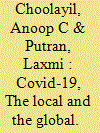

|
|
|
|
|
| Summary/Abstract |
This article offers a cross-sectional exploration of the COVID-19 containment strategy in Kerala and highlights its initial effectiveness in the Kasaragod district, the first to record a second stage transmission in the state with a cluster of cases from 23 March 2020 onwards. Despite its underwhelming healthcare infrastructure, Kasaragod district managed to contain the transmission and record a 100 per cent recovery rate, indicating a promising model of infection control. However, the district subsequently succumbed to community-level transmission when another wave of positive cases of COVID-19 was detected among repatriated overseas citizens on 7 May 2020. The article explores the confluence of elements that allowed the initial successful recovery from a second stage transmission and then examines the factors that later led to community-level transmission. Given the close connections of Kerala to other parts of the world through migration, the article illustrates how precariously the local is now part of the global.
|
|
|
|
|
|
|
|
|
|
|
|
|
|
|
|
| 6 |
ID:
095196
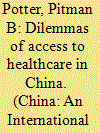

|
|
|
| 7 |
ID:
119910
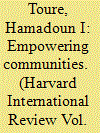

|
|
|
|
|
| Publication |
2012.
|
| Summary/Abstract |
The role of Information and Communication Technologies (ICTs), particularly broadband, in boosting economic growth and national competitiveness is now widely recognized. The ICT infrastructure is today both a vital national asset and an investment in a nation's future competitiveness in the growing global digital economy.
|
|
|
|
|
|
|
|
|
|
|
|
|
|
|
|
| 8 |
ID:
185225


|
|
|
|
|
| Summary/Abstract |
The COVID-19 pandemic has ushered in a wave of cyberattacks targeting the healthcare sector, including against hospitals, doctors, patients, medical companies, supply chains, universities, research laboratories, and public health organizations at different levels of jurisdiction and across the public and private sectors. Despite these concerns, cybersecurity in Canadian healthcare is significantly understudied. This article uses a series of illustrative examples to highlight the challenges, outcomes, and solutions Canada might consider in addressing healthcare cybersecurity. The article explores the various rationales by which Canadian healthcare may be targeted, unpacks several prominent types of cyberattack used against the healthcare sector, identifies the different malicious actors motivated to conduct such attacks, provides insights derived from three empirical cases of healthcare cyberattack (Boston Children’s Hospital [2014], Anthem [2015], National Health Service [2017]), and concludes with lessons for a Canadian response to healthcare cybersecurity from several international perspectives (e.g., Australia, New Zealand, the UK, Norway, and the Netherlands).
|
|
|
|
|
|
|
|
|
|
|
|
|
|
|
|
| 9 |
ID:
132545
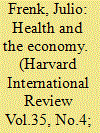

|
|
|
|
|
| Publication |
2014.
|
| Summary/Abstract |
W e are at a critical juncture in efforts to promote development around the world. If we are to meet the challenges of our times we need new forms of thinking and acting. The key to deal with a changing and increasingly complex reality is integration, and the starting point for integration is the acknowledgment of the crucial notion that social and economic policy are really two sides of the same coin. The recent evolution of global health epitomizes this idea. Indeed, many observers have remarked that the past decade can be seen as a new era in global health. The most important feature of this is the fact that health matters have stopped being the exclusive concern of domain experts. Instead, health has come to occupy a central place in the most pressing dimensions of the global agenda: economic development, national security, democratic governance, and human rights. In this context
|
|
|
|
|
|
|
|
|
|
|
|
|
|
|
|
| 10 |
ID:
132544
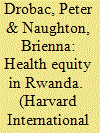

|
|
|
|
|
| Publication |
2014.
|
| Summary/Abstract |
This April, Rwanda will commemorate the 20th anniversary of one of the last century's greatest human tragedies, the 1994 genocide that took the lives of one million Tutsis and moderate Hutus in just one hundred days. As the global community turns its attention to Rwanda on this occasion, they will find a country radically different from the Rwanda of the past. The new Rwanda is a stable and increasingly prosperous country, one where life expectancy has doubled since the difficult aftermath of the genocide. The government's commitment to equity has catalyzed rapid and widespread development, largely by creating opportunity for its poorest citizens. Meanwhile, the health sector's pioneering efforts in health care delivery have drawn global attention. With strong leadership, smart partnerships and innovative programs, Rwanda is forging a new pathway for development.
|
|
|
|
|
|
|
|
|
|
|
|
|
|
|
|
| 11 |
ID:
102245
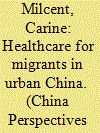

|
|
|
|
|
| Publication |
2010.
|
| Summary/Abstract |
How can healthcare access for Chinese migrants be improved? Migrant workers face two types of healthcare-access exclusion in the workplace: one is financial (because of their income) and the other is social (because of the lack of social networks in the city). We use 2006 data from a survey of rural migrant workers conducted in five of the most economically-advanced cities. The empirical findings support the hypothesis of a return to the hometown for migrant workers with poor health. Apart from residency permits and income, the social integration of migrant workers is also found to be a decisive factor in healthcare access.
|
|
|
|
|
|
|
|
|
|
|
|
|
|
|
|
| 12 |
ID:
091371


|
|
|
| 13 |
ID:
143103
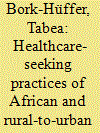

|
|
|
|
|
| Summary/Abstract |
Taking the examples of Chinese rural-to-urban migrant and African migrant businesspeople in Guangzhou, this article inquires into the commonalities and differences in the health status and healthcare-seeking practices of both groups. While both populations of migrants are diverse and heterogeneous, there are many commonalities with regard to the challenges they face compared to the Chinese local population. Mixed-methods research frameworks and qualitative and quantitative methods were applied. While existing publications emphasise lacking financial access to healthcare, further individual and social factors account for migrants’ healthcare choices. Their access to healthcare can be improved only by introducing insurance schemes with portable benefits, providing localised and culturally adequate health services adapted to migrants’ specific needs and health risks, and enhancing patient orientation and responsiveness by health professionals.
|
|
|
|
|
|
|
|
|
|
|
|
|
|
|
|
| 14 |
ID:
130054
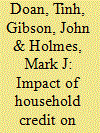

|
|
|
|
|
| Publication |
2014.
|
| Summary/Abstract |
There is an ongoing debate about whether microfinance has a positive impact on education and health for borrowing households in developing countries. To understand this debate, we use a survey designed to meet the conditions for propensity score matching (PSM) and examine the impact of household credit on education and healthcare spending by the poor in peri-urban areas of Ho Chi Minh City, Vietnam. In addition to matching statistically identical non-borrowers to borrowers, our estimates also control for household pre-treatment income and assets, which may be associated with unobservable factors affecting both credit participation and the outcomes of interest. The PSM estimates show a significant and positive impact of borrowing on education and healthcare spending. However, further investigation of the effects of the treatment reveals that only formal credit has a significant and positive impact on education and healthcare spending, while informal credit has an insignificant impact on spending. This paper contributes to the limited literature on peri-urban areas using evidence from one of the largest and most dynamic cities in Southeast Asia.
|
|
|
|
|
|
|
|
|
|
|
|
|
|
|
|
| 15 |
ID:
131505
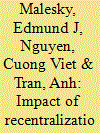

|
|
|
|
|
| Publication |
2014.
|
| Summary/Abstract |
Comparative political economy offers a wealth of hypotheses connecting decentralization to improved public service delivery. In recent years, influential formal and experimental work has begun to question the underlying theory and empirical analyses of previous findings. At the same time, many countries have grown dissatisfied with the results of their decentralization efforts and have begun to reverse them. Vietnam is particularly intriguing because of the unique way in which it designed its recentralization, piloting a removal of elected people's councils in 99 districts across the country and stratifying the selection by region, type of province, and urban versus rural setting. We take advantage of the opportunity provided by this quasi experiment to test the core hypotheses regarding the decision to shift administrative and fiscal authority to local governments. We find that recentralization significantly improved public service delivery in areas important to central policy-makers, especially in transportation, healthcare, and communications.
|
|
|
|
|
|
|
|
|
|
|
|
|
|
|
|
| 16 |
ID:
138046
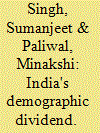

|
|
|
| 17 |
ID:
156097
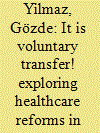

|
|
|
|
|
| Summary/Abstract |
The Turkish healthcare system has been transformed in the 2000s by adopting a comprehensive health model – the so-called Turkish Model. Although Europeanization dynamics were effective in Turkey in recent decades due to the acceleration of European Union (EU) accession process after 1999, healthcare reforms demonstrate a distinct process. This article analyzes the factors behind the health transformation through employing a policy transfer framework. It argues that a parallel process of health-policy transfer with Europeanization in other areas emerged in Turkey, and rather than the EU push, the Turkish healthcare model was a result of voluntary engagement for eliminating problems in this domain.
|
|
|
|
|
|
|
|
|
|
|
|
|
|
|
|
| 18 |
ID:
104618


|
|
|
| 19 |
ID:
124509
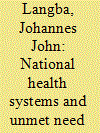

|
|
|
|
|
| Publication |
2013.
|
| Summary/Abstract |
This article examines challenges faced by the national health systems of African countries emerging from conflict in the provision of antiretroviral (ARV) medication and HIV/AIDS-related healthcare. It analyses resource profiles, the unmet need for antiretroviral medication, and progress in the provision of HIV/AIDS-related healthcare in Burundi, Liberia, Mozambique, Rwanda, Sierra Leone and Uganda, using data from the Global AIDS Response Progress Reports (GARPR) of 2011. Findings indicate that challenges to the health systems in post-conflict countries are immense and should not be underestimated, particularly in the context of HIV/AIDS. Policy recommendations for bolstering the performance of national health systems of post-conflict countries in the context of HIV/AIDS are proposed.
|
|
|
|
|
|
|
|
|
|
|
|
|
|
|
|
| 20 |
ID:
119892
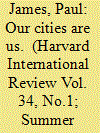

|
|
|
|
|
| Publication |
2012.
|
| Summary/Abstract |
As the dominant site and sign of human settlement, the city exemplifies and displays the fundamental concerns of the human condition in the twenty-first century. Just as urban living concentrates us in close proximity, the city clusters clichés and sermons, critiques and self-serving assurances. The world's most livable cities are well-planned and prosperous. Slums are disgusting. Congestion causes road rage. Electric vehicles are the answer. Planning is good.
|
|
|
|
|
|
|
|
|
|
|
|
|
|
|
|
|
|
|
|
|